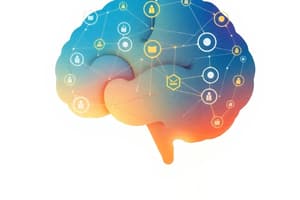Podcast
Questions and Answers
What is social cognition?
What is social cognition?
- Thinking about the thoughts, feelings, motives, and behavior of self and others. (correct)
- Communicating effectively in groups.
- Thinking about one's own emotions.
- Understanding social norms.
What is the theory of mind?
What is the theory of mind?
The understanding that people have mental states, such as feelings, desires, beliefs, and intentions, that explain their behavior.
What is a false belief task?
What is a false belief task?
A research paradigm used to assess an important aspect of theory of mind, mainly the understanding that people can hold incorrect beliefs.
At what age do children typically pass the false belief task?
At what age do children typically pass the false belief task?
What disorder do children often have difficulty with regarding theory of mind?
What disorder do children often have difficulty with regarding theory of mind?
What are some precursors and contributors to theory of mind?
What are some precursors and contributors to theory of mind?
What are mirror neurons?
What are mirror neurons?
What are the benefits of having a theory of mind?
What are the benefits of having a theory of mind?
What is desire psychology?
What is desire psychology?
What does belief-desire psychology reflect?
What does belief-desire psychology reflect?
How does theory of mind relate to popularity?
How does theory of mind relate to popularity?
What can parents do to promote a theory of mind?
What can parents do to promote a theory of mind?
Flashcards are hidden until you start studying
Study Notes
Social Cognition
- Involves thinking about one’s own thoughts, feelings, motives, and behaviors as well as those of others.
Theory of Mind
- Refers to the ability to understand that others have individual mental states, such as feelings, desires, beliefs, and intentions, which help explain their behaviors.
False Belief Task
- A research approach used to gauge the understanding that others can hold incorrect beliefs and be influenced by them.
Age Milestone
- Children typically pass the false belief task at around 4 years of age.
Autism and Theory of Mind
- Children diagnosed with autism often struggle with the concept of theory of mind.
Contributors to Theory of Mind
- Essential precursors include joint attention, understanding intentions, pretend play, imitation, and emotional understanding.
Mirror Neurons
- Specialized brain cells activated during both the performance and observation of actions; linked to imitation, empathy, theory of mind skills, and language.
Benefits of Theory of Mind
- Enables individuals to find meaning in others' behaviors, contributing to a sense of order and purpose in life.
Desire Psychology
- Represents the initial stage of theory of mind, highlighting that desires motivate behavior, such as seeking liked things and avoiding disliked ones.
Belief-Desire Psychology
- A more advanced understanding, evident by age 4, where both desires and beliefs are recognized as motivational factors, with awareness that beliefs may not align with reality.
Popularity and Emotional Intelligence
- Individuals with higher emotional intelligence and better understanding of sarcasm, developed through theory of mind, tend to be more popular among peers.
Promoting Theory of Mind in Children
- Parents can encourage theory of mind development by discussing characters' thoughts and feelings in books and incorporating language related to thinking and feeling in conversations.
Studying That Suits You
Use AI to generate personalized quizzes and flashcards to suit your learning preferences.




